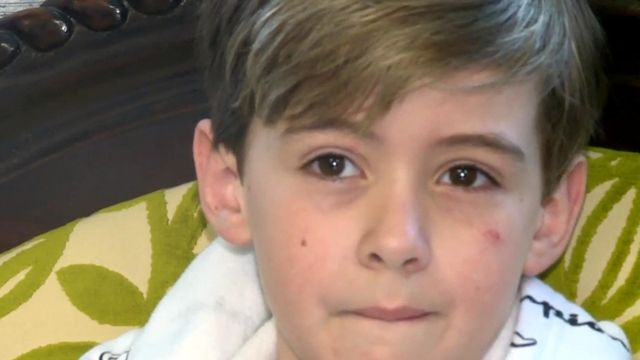Pandemic taking mental toll on even young children
The pandemic has been a struggle for everyone, including children. With so many learning from home, the sense of isolation can lead to depression and even thoughts of suicide.
Posted — UpdatedCarson Creech learned that firsthand during one of his virtual classes. When the teacher asked if anyone had anything to share, an 8-year-old boy spoke up.
"I've never shared this with anyone," Carson recalled the boy saying. "He just, like, wanted peace. He thought, if he, like, died, it would give him peace, but that is not the answer."
Carson's mother, Sarah Brooks, was within earshot, drinking her morning coffee.
"That day, when I heard the call for help, I couldn't even get words," Brooks said. "I had so many thoughts coming through my head, thinking does my child even understand what this means?"
Carson and Brooks said the boy gave no details about his circumstances, only that he wanted to end it all.
"It was going through my mind, like, that's not the answer. I've got to help him," Carson said.
"Before anything else could be said, Carson had chimed in and said, 'Please, I want to be your friend,'" Brooks added. "It blew my mind. I was off camera, but sobbing."
Victor Armstrong, the director of the state Division of Mental Health, said suicides do occurr among children younger than 10.
"It's more common, I think, than people think," Armstrong said.
Suicides among youths ages 10 to 17 were trending down before the pandemic, from 52 in 2018 to 36 in 2019, but Armstrong said he fears that 2020 numbers, which aren't yet available, went back up amid school closures and canceled activities.
"There has been a substantial increase in children expressing depression and depressive symptoms. So, we know those things are happening; we know those things are there," he said.
Depression in youth commonly displays itself through anger and rebelliousness, Armstrong said. The worst thing a parent can do is to downplay a child's feelings, he added.
"Step one is to validate those feelings. Step two is to get them to help, get them someone they can talk to, a mental health professional," he said.
In the case of Carson and his classmate, he said, "One of the things that worked in this child's favor was that he was talking to a peer."
Fonda Bryant, the chief executive of Wellness Action Recovery in Charlotte, leads suicide prevention classes in QPR – question, persuade and refer – for teens and adults.
"I've been nonstop with helping parents, helping students" during the pandemic, Bryant said.
She called suicide "the silent epidemic," noting that she tried to kill herself 26 years ago.
"Until we let people know that suicide is a health crisis, they will continue to think it's a character flaw. They will continue to think it's an isolated incident," Bryant said.
Armstrong encouraged parents to talk with their children about mental health.
"We've all been young, and you know that when you're young, oftentimes today is all there is in your mind," he said. "When children see this extreme emotional pain they're going through, they often can't see beyond that, and to them, this is all there is, and they want this to stop. So, part of what we have to be able to do is let them see that there is hope and that there is hope on the other side of this."
Brooks and Carson are having such conversations now.
"Everybody's life matters, and we all deserve life," Carson said.
His 8-year-old classmate got help, Carson's school recognized him with the Citizenship Award for his actions – and they each made a new friend.
Related Topics
• Credits
Copyright 2024 by Capitol Broadcasting Company. All rights reserved. This material may not be published, broadcast, rewritten or redistributed.





